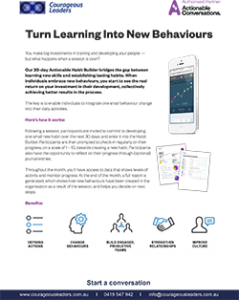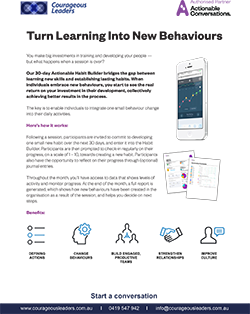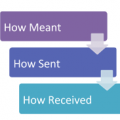
Turning Learning into New Behaviours
In developing the leadership capability of both emerging/future and existing leaders over the last 20 years we have observed many trends impacting on successful outcomes. Surprisingly, successful outcomes are not assured by the content of the programs – the content could be the latest and greatest from a respected university like Harvard and yet if the learning doesn’t stick it is still concluded that the event was a waste of time. Content is not king when it comes to learning. Let me remind you of the wise words of Confucius:
“I hear and I forget. I see and I remember. I do and I understand.”
We have worked tirelessly and bravely over the last 18 months to hone our approach to building leadership capability by implementing the new Actionable Conversations Habit Building Platform – and we will share some case studies over the next couple of months showing the amazing outcomes we are achieving for our clients, with their individual program participants.
CURRENT STATE
What we are dealing with now in any development program or learning initiative are people who are:
- time-poor
- overwhelmed with data while they work in a VUCA environment
- under-resourced and most often with an under-skilled team too
- working toward the achievement of relentless KPIs
- increasingly searching for better work/life balance.
RETURN ON INVESTMENT
Making the learning stick so organisations reap ROI for the money they spend on development initiatives has become increasingly vital. Executive teams are far more discerning about what they will spend money on, especially when it comes to developing the leadership capability of their people. They rightly want to see a return!
We are being asked more often about what is going to make our initiative different because they’ve had their people participate in training programs previously and the change in the workplace has simply not been enough to warrant the money spent.
DAILY HABITS
With the active encouragement of our Actionable Consultant global team members to delve into the great work of people like Charles Duhigg, author of The Power of Habit, BJ Fogg’s Behaviour Model and James Clear of Atomic Habits; we have created a clear picture of the importance of daily habits when implementing learning into the workplace.
Daily habits are tiny routines that are repeatable — they are what make the big dreams and ideas in
- an annual plan;
- in a transformational change initiative or;
- those contained in the content of a development initiative;
a reality.
The secret lies in the habit-building formula enunciated by James Clear:
Reminder: trigger that initiates the behaviour
Routine: the behaviour itself
Reward: the benefit you gain from doing the behaviour.
We recognise the importance of a shift away from the performance focus (achieving a KPI within a specific timeframe) and rather looking to support people to set a schedule to remind themselves to build a habit. Instead of giving themselves a deadline to accomplish a particular goal by (and then feeling like a failure if they didn’t or just couldn’t) they set a schedule to “build a habit” consistently – to the extent that they are rewarded by this consistent and disciplined focus.
It’s about bringing a focus on the process and not the result – a technique used in sports coaching for several years now!
OUR HABIT BUILDING PLATFORM
Excitedly we have the Actionable Conversations Habit Building Platform that encourages and supports this kind of scheduling to build a habit.
After a learning event such as a workshop, conference session or program module, people commit to focus on a small daily habit for the next 30 days. This commitment is made on the Habit Building Platform and over the course of the next 30 days, their routine (of committing to the small behaviour) is prompted by requesting an on on-line check-in and rating of how they are progressing with their habit.
We still find some people resist this kind of discipline – especially the more senior people in leadership teams – because it demands personal accountability and transparency. People are not used to this after participating in a learning event. Learning professionals have worked for years in the knowledge that 90% of what people learn is lost within the first 90 hours after a learning event if it is not put into direct use. So we have first-hand experience with our clients in how the Habit Building Platform is changing the landscape for learning.
Look out for more news about the success being created for our clients and the individuals participating in the leadership programs! Or engage in a conversation with us now to find out how you can leverage our research and insights.










